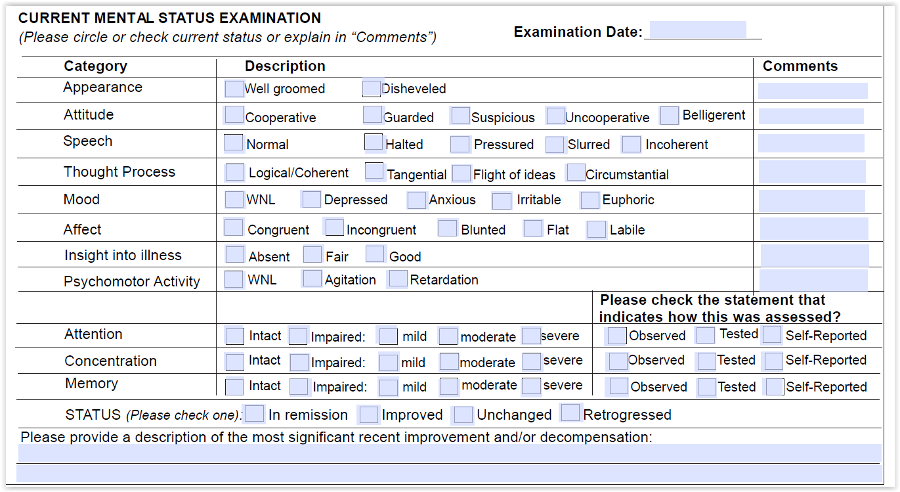Social Security Disability Application Part 1 Update: Your Questions Answered!
Answering your questions about how to apply for Social Security Disability Insurance (SSDI)

Read the Series:
- Social Security Disability Application Part 1: Filling Out the Forms
- Social Security Disability Application Part 1 Update: Your Questions Answered!
- Social Security Disability Application Part 2: The Doctor Evaluation
- Social Security Disability Application Part 3: Winning the Hearing
Intro
There was a great response to my first article about what it was like for me to apply for Social Security Disability Insurance (SSDI). Among that were some questions which people brought up, so I thought I'd take a moment to answer.
First, let me again give a shout out to this article over on Sick Note which is another point of view on the SSDI application process. The guest author, Beatrice Adler-Bolton, does a great job of talking about both her experience and putting it into the greater context of how it affects many who apply. The article came out on the same day as mine so I wasn't able to add the link in time for my email subscribers to see, hence me mentioning it again here.
She also raised some points that helped me realize things that my personal health experiences had me take for granted, so I'll touch on that as they relate to the questions below.
With that, let's get started! Your questions, in no particular order:
How Long Did It Take To Get Approved?
I'll be a little vague on dates here to help hide my personal details. Also I forget the exact moment the company helping me started the SSDI application process, but my SSDI approval says that my official disability start date was in 2018. My approval came January 2021. So, assuming the application process was started close to my eligibility, that's about three years from the first application until I got approved.
It also took three applications total. The first two I was rejected, the last one I was approved. I'll talk more about what applications two and three were like in future installments. But the big thing to remember here is that three applications and three years is fast compared to what many people go through. I don't know if the comparative speed of my approval is due to how sick I am or due to having had help with my application. It could be some of column A and some of column B.
What Paperwork Was Needed?
My bad for not realizing that when I said paperwork was filed it might be helpful to mention what exactly that paperwork was. Whoops!
There was a lot of paperwork which was needed for the entire process and it all blurs together now. But luckily the Social Security website has all the details.
The short version is that there are application forms that need to be filled out (which you can either do online or download a PDF version) and they will need information from your doctors and documentation about your income, if any.
What Income Information Do They Need?
If you have any income during the period that you are saying you are disabled they want to know why. For example in my case I had my private disability insurance and a few other similar items. I had to provide documentation to prove that money came from where I said it did and that it wasn't due to me working somehow.
You see, one of the big sticking points about getting SSDI is if you can work. Which on the one hand makes sense: the point of SSDI is to provide financial assistance to those who are unable to work. If you are working, by definition you are able to work.
But on the other hand there's the catch-22 pointed out by the Sick Note guest article which is that not everyone has the luxury of stopping work even if working is effectively killing them. This is 100% where my privilege comes into play. I had private disability insurance. I had savings. I could afford to pay the ridiculously expensive COBRA cost to keep my healthcare and have a financial cushion for a chunk of those three years.
Which in and of itself is an irony because it could be argued that therefore the people who are best served by this system are the people who don't need it as much. I mean I do need my SSDI and other aid right now. I have no income otherwise. But if you compare me at the start of my application to somebody with no insurance, no savings, living paycheck to paycheck while dealing with disabling health issues they are absolutely the person the system should be helping most. And yet they are being helped the least. It's awful.
What Medical Information Do They Need?
They ask for records from any doctors who are somehow connected to your overall wellbeing. So in my case this meant the various specialists I see for both my physical and mental health issues, but not folks like my general practitioner or eye doctor.
As part of the overall process they also want information as it relates to various checkboxes for someone's ability to work. And the thing here is that they are looking at can you do any job. The goal in their eyes is to get you working somewhere, anywhere, so you are not the government's problem.
Which means they want to know things like can you lift certain weights, can you stand for certain periods of time, can you sit for certain periods of time, and so on. Because let's say in your previous job you worked construction and then you hurt your back. Can you still sit for hours at a time? Okay, get an office job. Or the flip side: if you can't stare at a computer screen because it gives you migraines but you can still lift twenty pounds, get a job in a warehouse.
There's no consideration for whether you have the skills for these jobs or if these jobs are feasible for the income you need to stay alive or anything like that. It's "Can you work anything anywhere? Yes? Okay application denied."
Part of helping them make this decision is asking questions about what your life is like in general. So things like what are your symptoms? What makes them better or worse? Do your medications have side effects? Are you able to do self-care such as feeding yourself or basic hygiene? What is your overall state of being?
This is where reading the Sick Note article made me realize what I took for granted. Because all of these things were questions asked by my private disability insurance the whole time. Moreover, as someone dealing with severe Depression, concepts like difficulty making a meal or taking a shower were old hat because those are symptoms which need to be monitored, no different than checking blood pressure for someone with hypertension.
This isn't from an SSDI application but it covers some of the topics well enough that it'll give you an idea:

Being asked those questions was no different to me than making small talk about the weather. I forgot that for most people these questions are going to feel very invasive and uncomfortable to address. Sadly having to lay out all your weaknesses and vulnerabilities are part of the process. I'll talk about that more as I get into the second and third applications.
Where Do You Find Companies To Help You Apply?
The company I used was thrust upon me by my private disability insurance. I was incredibly lucky in that regard. Particularly since, as anybody who has tried googling information about applying for disability knows, it is hard to weed out all of the ambulance-chasey "Top Ten Ways To Get Approved For Disability No Matter How Sick You Really Are! (The Government Hates #7!!!)" type articles in order to get real help.

Sadly, because I need to keep my information private, I don't feel comfortable coming right out and saying which company I used. Believe me I would love to, not only because they were amazing and so helpful but also because they give referral fees. (So… uh, if you actually know my name IRL and also need a company like this hit me up privately I guess?)
That being said I don't want to leave folks high and dry so I did some reverse engineering to figure out how do you find legitimate places if you aren't lucky enough to have private insurance hooking you up with one.
To that end, the key words you need to use are things like "Social Security Disability Advocates" or "Social Security Disability Lawyer." You should also take a look at this PDF which explains the rules about what your representative can do for you and things like how much they are allowed to charge.
I can also give you these examples of representatives which, as far as I can tell, do take clients directly in addition to people like myself who became a client via an insurance company.
I can neither confirm nor deny if any of those are the one that I worked with. But a quick amount of research on my part suggests that they are all comparable and it's possible that one of them may remind me of the company that I worked with enough that I feel comfortable saying these above suggestions are at least worth checking out.
Outro
And that's all for now! Thank you so much to everyone who had such great suggestions on ideas that could use some clarification. Please let me know if there are any other details or topics that I missed. The next planned installment of this series will be about the second time I applied, which involved an in person appointment with a doctor picked by Social Security.
Read the Series:
- Social Security Disability Application Part 1: Filling Out the Forms
- Social Security Disability Application Part 1 Update: Your Questions Answered!
- Social Security Disability Application Part 2: The Doctor Evaluation
- Social Security Disability Application Part 3: Winning the Hearing
Outro
Want to help support the site and get access to the Bonus Content? Sign up for a paid subscription or donate via Ko-Fi. Thank you!

